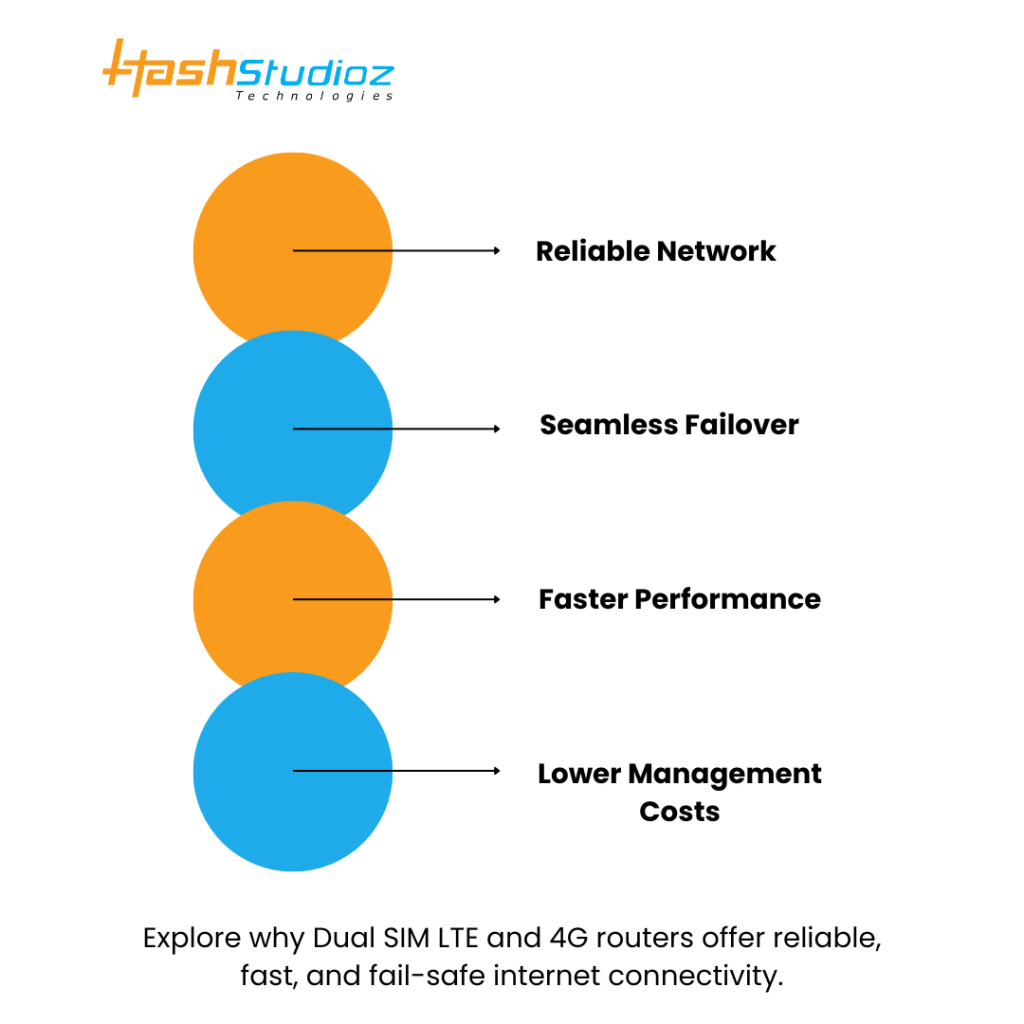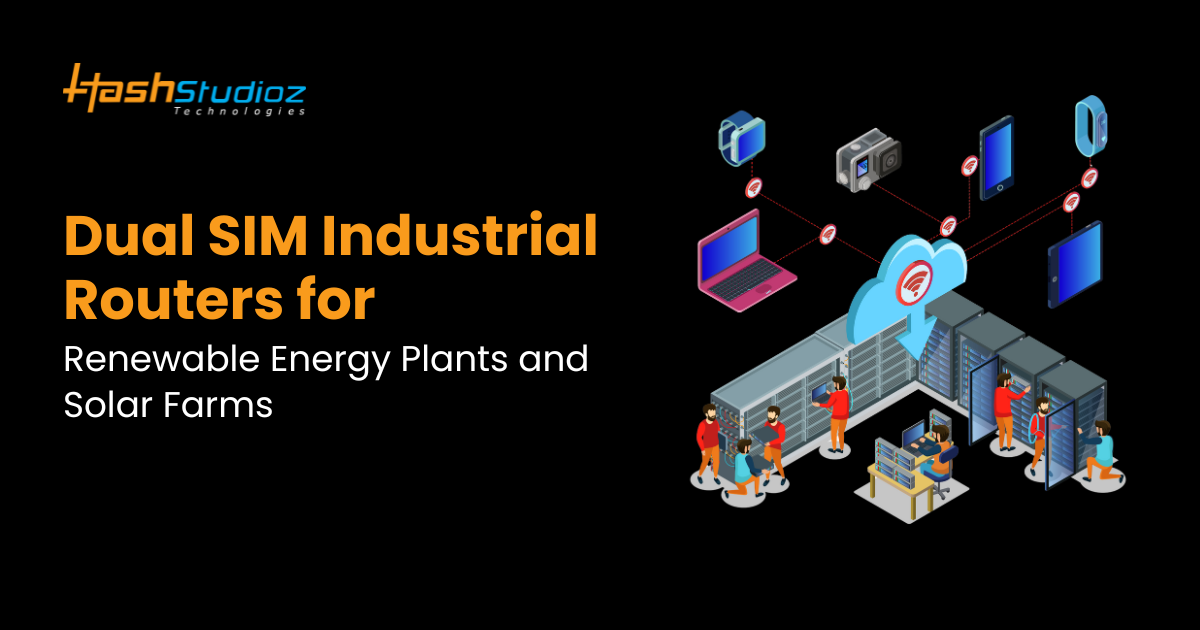In 2025, the demand for resilient communication infrastructure in renewable energy plants and solar farms is soaring alongside the global growth of renewable energy. Reports estimate that over 60% of new energy capacity installed worldwide will come from solar and wind sources by 2030. This shift demands advanced connectivity solutions that ensure uninterrupted data flow and remote monitoring. Dual SIM LTE routers and Dual SIM 4G routers are emerging as critical components in managing these facilities. They provide enhanced network reliability, flexibility, and security in challenging outdoor environments.
Table of Contents
- What Are Dual SIM Industrial Routers?
- Importance of Robust Connectivity in Renewable Energy Plants
- Why Choose Dual SIM LTE and 4G Routers?
- Real-World Example
- Technical Specifications and Features of Dual SIM Industrial Routers
- Applications in Renewable Energy Plants and Solar Farms
- Industry Statistics and Market Growth
- Challenges and Considerations
- Future Trends
- Reliable Connectivity for Solar & Renewable Energy Plants with HashStudioz
- Why Choose HashStudioz?
- Our Key Services Include:
- Partner with HashStudioz
- Recommended Dual SIM Industrial Router for Renewable Energy Plants and Solar Farms
- Conclusion
What Are Dual SIM Industrial Routers?
Industrial routers are rugged devices designed to provide reliable network connectivity in harsh environments. Unlike consumer routers, they can handle extreme temperatures, vibration, dust, and electromagnetic interference. Dual SIM industrial routers expand this reliability by supporting two subscriber identity modules (SIM cards) simultaneously, typically LTE or 4G cellular connections.
The key terms involved are:
- Dual SIM LTE Router: A device that supports two LTE SIM cards for wireless communication.
- Dual SIM 4G Router: A router supporting two 4G LTE SIM cards, a technology often used interchangeably with LTE.
These routers enable automatic switching between two cellular networks, minimizing downtime by providing seamless failover. If one network experiences poor signal or goes offline, the router switches to the other SIM’s operator network.
Importance of Robust Connectivity in Renewable Energy Plants
Renewable energy plants, including solar farms and wind turbines, rely heavily on automation and remote monitoring systems. Data from sensors, inverters, and control units must be transmitted continuously to control centers or cloud platforms. Strong, stable connectivity ensures:
- Real-time monitoring: Immediate detection of any faults or inefficiencies.
- Remote management: Ability to configure and troubleshoot devices from afar.
- Data integrity: Continuous transmission of performance data critical for optimization.
- Operational safety: Quick alerts for hazardous conditions.
Any network downtime risks loss of data, reduced energy output, and increased operational costs. According to industry studies, reducing network downtime by just 5% can improve energy plant efficiency by up to 3%, translating to significant gains over operational life.
Why Choose Dual SIM LTE and 4G Routers?

Enhanced Network Reliability
Dual SIM capabilities allow routers to connect to two different network providers or frequencies simultaneously. This redundancy ensures continuous connectivity, even in remote locations where network coverage may be spotty.
Seamless Failover for Critical Systems
When an LTE or 4G cellular connection drops, automatic failover switches traffic to the second SIM without manual intervention or service interruptions. This is crucial for energy plants that must maintain online communication 24/7.
Improved Network Performance
Dual SIM routers can be configured for load balancing, distributing traffic across both SIM connections. This feature enhances bandwidth availability and ensures efficient data transmission even under peak loads.
Cost-Effective Network Management
Using multiple SIM cards enables operators to select cost-effective data plans from different carriers, preventing expensive overage charges and optimizing data costs. This flexibility is particularly useful in cross-border solar farms or international renewable energy projects.
Real-World Example
A solar farm in the southwestern United States deployed dual SIM LTE routers connecting to two carrier networks AT&T and T-Mobile. During a regional storm when AT&T’s network degraded, the system automatically switched to T-Mobile. The farm experienced zero data loss and no downtime, enabling continuous monitoring and remote control of solar arrays.
Dual-SIM LTE 4G Industrial Router: Best Uses and Applications
Technical Specifications and Features of Dual SIM Industrial Routers
Dual SIM industrial routers incorporate specialized hardware and software tailored for the renewable energy sector:
- Wide Temperature Range: Operate reliably in environments from -40°C to +75°C, suitable for outdoor solar farm conditions.
- Robust Enclosures: Metal or IP-rated casing resistant to dust, moisture, and corrosion.
- Multiple Communication Interfaces: Support for Ethernet ports, Wi-Fi access points, RS232/RS485 serial ports for sensor integration.
- High Data Throughput: LTE Cat 4 and Cat 6 support with speeds up to 300 Mbps downlink.
- Security Protocols: Includes VPN support, firewall protections, data encryption, and secure remote access to prevent cyberattacks.
- Intelligent Traffic Control: Quality of Service (QoS) tools prioritize critical sensors and control data over less important traffic.
- Network Monitoring and Management: Remote configuration, firmware upgrades, and diagnostics using centralized IoT management platforms.
Manufacturers like USR IOT, Teltonika, and Robustel offer models calibrated for large-scale renewable energy applications, meeting standards such as IEC 61850 for power utilities.
Applications in Renewable Energy Plants and Solar Farms
Remote Solar Panel Monitoring
Dual SIM routers gather data from distributed solar inverters and weather sensors, transmitting real-time performance metrics to cloud platforms. This continuous stream enables predictive maintenance that lowers downtime by up to 30%.
Wind Turbine Control Networks
Wind farms often span hundreds of square kilometers. Reliable connectivity facilitated by dual SIM 4G routers supports Supervisory Control and Data Acquisition (SCADA) systems that optimize turbine operations based on wind conditions.
Battery Energy Storage Systems
Industrial routers bridge local controllers of battery storage installations with energy management systems. High availability ensures safe charging/discharging schedules and grid synchronization.
Grid Connection Points
At points where renewable energy plants feed electricity into the grid, dual SIM LTE routers secure telemetry data feeds vital for grid operators’ load balancing and stability controls.
What is an LTE Router and What Are the Use Cases Over a Traditional Router?
Industry Statistics and Market Growth
- The global wireless industrial router market, driven largely by LTE and 5G technologies, is forecast to grow at 12% CAGR, reaching $24.59 billion by 2034.
- Renewable energy infrastructure contributes significantly to this growth, as 45% of industrial router deployments occur in energy sectors including solar and wind by 2025.
- Reports indicate dual SIM routers reduce network downtime by over 80% in remote industrial sites compared to single SIM alternatives.
- Up to 70% of new solar farms commission dual SIM routers for connectivity due to their ability to handle unpredictable network conditions.
These trends highlight the increasing reliance on dual SIM LTE and 4G routers to maintain resilient communication in renewable energy.
Challenges and Considerations
Despite their benefits, deploying dual SIM industrial routers in renewable energy contexts requires attention to several factors:
- Network Coverage Mapping: Ensuring both SIM providers cover the site adequately.
- Power Supply Stability: Routers must have UPS or solar power backup to handle power outages.
- Cybersecurity Measures: Strong encryption and authentication safeguards are necessary to protect mission-critical systems.
- Compliance: Adherence to regional telecom regulations and industrial standards.
Proper site surveys and network design are essential to maximize the advantages of dual SIM routers.
Future Trends
The evolution toward 5G and NB-IoT technologies will further enhance industrial router capabilities. Dual SIM routers will increasingly integrate 5G for ultra-low latency and higher bandwidth alongside LTE fallback. This hybrid approach is ideal for renewable energy plants requiring real-time control and massive sensor data processing.
AI-driven network management is expected to automate failover decisions based on predictive analytics, improving uptime beyond current levels. Edge computing capabilities in industrial routers will also reduce latency for critical operations within solar farms and wind plants.
Reliable Connectivity for Solar & Renewable Energy Plants with HashStudioz
Maintaining continuous and reliable network connectivity is essential for the efficient operation of renewable energy plants and solar farms. These sites often face challenges like remote locations, harsh weather conditions, and fluctuating network signals, which can disrupt data transmission and monitoring.
Dual SIM industrial routers provide a robust solution by offering automatic failover between two cellular networks. This ensures uninterrupted communication, real-time data transfer, and enhanced control over energy systems, even in areas with poor or unstable network coverage.
Why Choose HashStudioz?
At HashStudioz, we specialize in delivering tailored IoT and industrial connectivity solutions designed to meet the unique demands of the renewable energy sector. Our expertise covers the full spectrum from hardware integration to advanced software solutions, ensuring your operations stay connected and efficient.
Our Key Services Include:
- Industrial IoT Device Integration: Seamlessly connect your renewable energy hardware with reliable Dual SIM industrial routers.
- Custom Firmware Development: Tailor router functionalities to meet your specific operational needs and security requirements.
- Remote Monitoring & Management: Access real-time data and control your devices remotely with intuitive dashboards.
- SCADA System Integration: Combine data from multiple sources for centralized monitoring and automation of your energy plant.
- Predictive Maintenance Solutions: Use AI-driven analytics to anticipate equipment failures and minimize downtime.
- End-to-End IoT Deployment & Support: From planning and installation to ongoing maintenance, we support you at every stage.
Partner with HashStudioz
With HashStudioz, you get a reliable partner committed to enhancing your renewable energy infrastructure through innovative connectivity solutions. Our Dual SIM industrial routers ensure your solar farms and energy plants operate smoothly, with minimal disruption and maximum efficiency. Ready to Enhance Your Energy Plant’s Connectivity? Contact HashStudioz today to explore how our Dual SIM industrial routers and IoT services can transform your renewable energy operations.
Recommended Dual SIM Industrial Router for Renewable Energy Plants and Solar Farms
For renewable energy operations, maintaining continuous network connectivity is essential to monitor plant performance, manage energy distribution, and ensure smooth operations. Selecting a router with dual SIM support and intelligent failover is key to minimizing downtime and keeping operations running seamlessly.
The Dual SIM 4G LTE Industrial Router from IoTStudioz is designed with dual SIM profiling technology, which actively monitors network performance and automatically routes traffic through the most reliable cellular connection. This proactive approach ensures uninterrupted connectivity, even in remote locations or areas with fluctuating signal strength.
Built for the harsh environments typical of solar farms and renewable energy plants, this router supports reliable communication for applications such as solar panel monitoring, wind turbine data collection, energy management systems, and other mission-critical renewable energy operations. Its rugged construction, secure connectivity features, and intelligent failover capabilities make it an ideal choice for energy companies that cannot afford network interruptions.
Order Now Dual SIM 4G LTE Industrial Router

Conclusion
Dual SIM LTE routers and Dual SIM 4G routers play an indispensable role in renewable energy plants and solar farms. They combine rugged industrial design with dual-network redundancy to ensure stable, secure, and high-performance communication under challenging outdoor conditions. Their ability to maintain continuous connectivity helps plant operators monitor, control, and optimize energy production effectively.
As renewable energy adoption accelerates and system complexities grow, dual SIM industrial routers will remain a cornerstone technology enabling the smart, safe, and efficient operation of green energy infrastructure worldwide.

